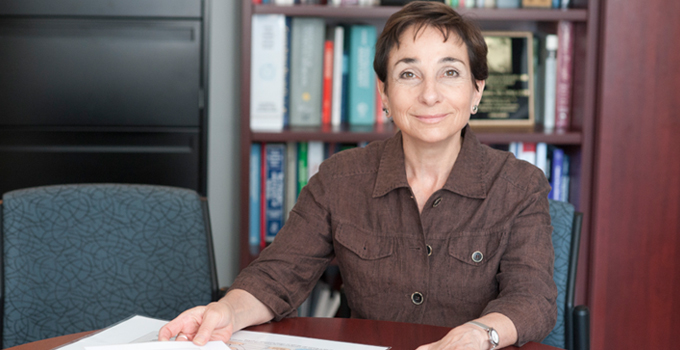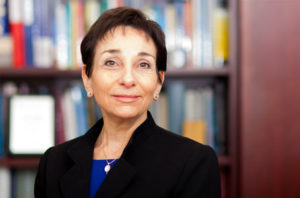Dr. Eva Grunfeld was honoured for her work translating evidence into practice to improve family medicine services for people with cancer.
Years of dedicated practice and groundbreaking research made OICR Clinician Scientist Dr. Eva Grunfeld a leader in family medicine.
The author of several high-impact studies, Grunfeld is widely recognized for helping improve primary care services for cancer patients, earning a Lifetime Achievement Award from the Foundation for Advancing Family Medicine and most recently being named an officer of the Order of Canada.
But what first made Grunfeld an advocate for the role of the family doctor began long before the awards, back when she was the young child of immigrant parents living in Montreal.
Her serious injury from a motor vehicle accident thrust Grunfeld and her family into the heart of an unfamiliar health system. The maze of doctors, nurses and specialists they encountered was fragmented and confusing, not to mention the culture and language barriers they faced.
“Nobody was overseeing our care or giving advice to help us navigate the system,” Grunfeld says. “It gave me compassion for people going through that experience and motivated me to want to help them through it.”
Grunfeld took that lesson with her as she grew up to study medicine at McMaster University and earn a D.Phil in epidemiology from the University of Oxford. She then carried it through into her medical practice and her research, which — though diverse — has largely focused on improving continuity of care for cancer patients from prevention to end-of-life care through better linkage with family medicine.
Preventing cancer has been a major focus for Grunfeld, who is a Professor in the University of Toronto’s Dalla Lana School of Public Health as well as the Department of Family & Community Medicine. For example, the BETTER Program she co-created trains primary care practitioners to better screen patients for chronic diseases and have important discussions with them around prevention.
“We as health care practitioners can do a better job communicating prevention messages to patients in a more integrated way,” Grunfeld says. “And BETTER is a program to support family doctors’ ability to deliver prevention and screening for cancer and other chronic diseases.”
When it comes to treating cancer, Grunfeld is a pioneer internationally in the area of primary care oncology. She is also a leading voice in cancer health services research, a field that focuses on using evidence to guide best practices in healthcare. Her research has tackled all sorts of questions about how to improve cancer care, from ways to better support chemotherapy patients at home to giving patients better access to genetic services.
Underlying all Grunfeld’s health services research are the complex barriers to translating research into practice. “There’s a well-recognized loss of knowledge between basic science and clinical practice,” says Grunfeld, who was also Director Knowledge Translation Research for the joint OICR-Cancer Care Ontario Health Services Research Program. “We are still working to overcome this challenge, but I think, of all disciplines, oncology is at the forefront of evidence-based practice.”
Cancer care doesn’t end after treatment, and Grunfeld is internationally recognized for her pioneering research on cancer survivorship, which focuses on people’s wellbeing from their diagnosis until the end of their lives. She has led some of the largest ever clinical trials on the topic, including studying survivorship care plans for people with cancer in the hopes of helping patients live better after their initial treatment is over.
Grunfeld says she was surprised and honoured to be among those just named to the Order of Canada. She credits the strong teams of collaborators she has worked with over the years and says she is grateful for the support from organizations like OICR, which has enabled her to balance the demands of her practice and her research.
While still working on several projects, her focus continues to be translating research into practice, including implementation of the BETTER Program.
In the future, she says her research will always be guided by the needs of the system and the needs of families.
“Times of illness are so important and difficult for people and families,” she says. “Helping them through these times is very important and, I believe, a very honourable thing to do.”


